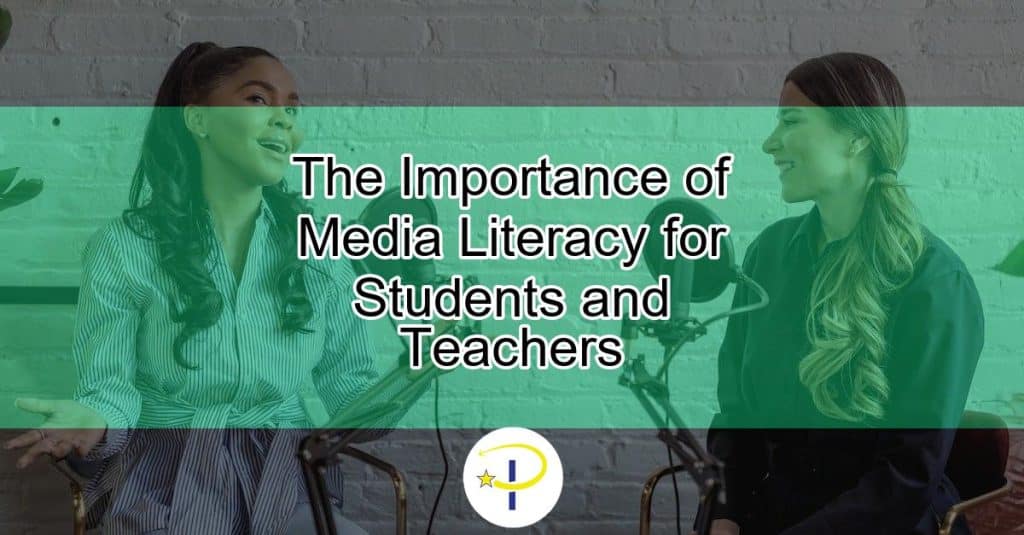In today’s digital age, media literacy has become more important than ever before. With so much information available at our fingertips, it’s easy to be overwhelmed by the sheer volume of data and to fall prey to biases and misinformation. This is why understanding media literacy is so critical for students and teachers alike.
Defining media literacy is the first step to understanding its importance. Media literacy refers to the ability to access, analyze, evaluate, and create media in various forms. By developing media literacy skills, individuals can better understand the role media play in shaping our beliefs, attitudes, and actions.
So why does media literacy matter? Simply put, media literacy is essential for navigating today’s complex world. Without it, individuals may not be equipped to distinguish between fact and fiction, or to recognize the influence that media have on our perspectives. Additionally, media literacy can help foster critical thinking skills, encourage civic engagement, and empower students and teachers to be more active, informed members of society.
Implementing media literacy in the classroom is a crucial step in preparing students for the future. By incorporating media literacy into the curriculum, educators can help students develop the skills they need to succeed in their personal and academic lives. This can include teaching media literacy skills such as fact-checking, analyzing media bias, and creating media responsibly.
In conclusion, media literacy is an essential skill for students and teachers alike. By understanding the importance of media literacy and implementing it in the classroom, we can create a more informed, engaged, and responsible society. So let’s get started!
Understanding Media Literacy
Defining Media Literacy
Media literacy can be defined as the ability to access, analyze, evaluate, and communicate information in a variety of media formats. This skill helps individuals to think critically about what they are seeing, reading, and hearing in the media and to understand the different perspectives and biases that can affect their perceptions of a particular topic or event.
Media literacy is not limited to traditional sources like news media, but rather includes a wide range of content that people interact with every day, including social media, advertising, and entertainment media. Developing media literacy skills is crucial in a world where individuals are exposed to an ever-increasing amount of information that can be misleading or false.
Why Media Literacy Matters
Media literacy skills are essential for both students and educators to navigate the complex media landscape and to make informed decisions in their personal and professional lives. For students, media literacy skills can improve academic success and prepare them for future career opportunities that require the ability to analyze and evaluate information from different sources.
In addition, media literacy can promote civic engagement by encouraging individuals to be more informed and involved in their communities, and to recognize the role that media plays in shaping social, economic, and political issues.
The importance of media literacy has only increased in recent years with the rise of deepfakes and artificial intelligence-generated content, which can create an even greater challenge to recognize what is true and what is not. As media continues to evolve, it is more important than ever to equip individuals with the skills to understand and navigate today’s media landscape.
Therefore, educators have an important role to play in promoting media literacy through incorporating it into the curriculum and teaching students how to think critically about media messages. This will not only help students to succeed academically but will also prepare them to be responsible citizens in a rapidly changing world.
In conclusion, media literacy is a critical skill that is needed in today’s society to navigate the media landscape. Educators have a responsibility to teach and promote media literacy to students to foster critical thinking and good citizenship in a world of constantly evolving media.
Benefits of Media Literacy
In today’s digital age, media literacy has become an essential skill for students and educators. Being media literate means having the ability to critically analyze the information presented in media. It is crucial to be able to identify reliable sources and filter out misinformation and propaganda that can skew one’s understanding of events and topics. Below are some of the benefits of media literacy:
Developing Critical Thinking Skills
Media literacy teaches students to look beyond the surface level of media and analyze the underlying messages and potential motives behind them. By engaging in critical thinking and reflection, students can develop a better understanding of the world around them and become more aware of various biases and perspectives. Through the analysis of media, students develop skills like evaluating evidence, analyzing arguments, and deconstructing messages. These skills are essential for success in academics and the workplace, where decision making based on information gathered from various sources is critical.
Fostering Civic Engagement
Media literacy can also promote civic engagement by encouraging students to think critically about the media they consume and the issues that affect their communities. By analyzing media reports, students can evaluate the truthfulness and accuracy of the information presented, understand the viewpoints and interests involved, and determine what actions could be taken to address particular issues. Understanding the role media plays in public policy and societal decisions can empower students to participate in discussions surrounding these topics.
Empowering Students and Teachers
Media literacy provides students and educators with the tools to engage with media thoughtfully and responsibly. By teaching students how to navigate the vast amounts of information available online, they can avoid misinformation, propaganda, and disinformation. Educators can also benefit from media literacy skills by creating and sharing educational media content that is engaging, thought-provoking and designed to promote critical thinking. By fostering media literacy, students can become active participants in the media they consume, rather than passive recipients of information.
In conclusion, media literacy is an essential skill for students and educators alike. It promotes critical thinking, civic engagement, and empowerment, giving students the tools to effectively navigate and evaluate the vast amounts of information available in the digital age. By teaching media literacy, we can create a generation of informed and responsible citizens who are better equipped to make a positive impact in their communities.
Implementing Media Literacy in the Classroom
Incorporating Media Literacy in Curriculum
Incorporating media literacy in the curriculum is essential to equip students with the necessary skills to navigate the overwhelming amount of information in today’s society. Media literacy involves the ability to analyze, evaluate, and create media in various forms. It empowers students to think critically about the information they encounter and separate fact from fiction. By incorporating media literacy in the curriculum, educators can teach students how to identify credible sources, analyze media messages, and become more responsible consumers and creators of media.
Through media literacy, students can gain a deeper understanding of the social, cultural, and political context in which media operates. They can also develop a sense of agency as they learn to create media themselves, thereby becoming active contributors to the media landscape. Media literacy education is not limited to the traditional media like television and newspapers, but also includes social media, online videos, and other forms of digital media.
Teaching Media Literacy Skills
Teachers can teach media literacy skills in a variety of ways. For example, they can assign media analysis assignments, where students critically analyze various media messages. Educators can also provide a space for students to create their own media, whether it is a website, video or podcast. This can help students better understand the process of media creation and make them more discerning consumers of media. By teaching media literacy skills, educators can also help students become more active and informed citizens.
Media literacy education can be incorporated into various subjects, including language arts, social studies, and science. By doing so, students can learn how to evaluate diverse perspectives and opinions and gain a more well-rounded view of the world. Incorporating media literacy in the classroom is not only a way to prepare students for college and future careers but also an essential life skill that can benefit them in all areas of their lives.
In conclusion, incorporating media literacy in the curriculum is crucial to help students navigate the complex and often overwhelming media landscape. By teaching media literacy skills, students can become more informed, critical, and responsible media consumers and creators. Educators play a significant role in equipping students with these skills, making media literacy an essential part of their teaching practice.
References:
– Beckett, K., & Lee, A. (2019). Media literacy as a key component in creating media-savvy students. Journal of Broadcasting & Electronic Media, 63(2), 349-359.
– Hobbs, R. (2017). Empowering learners as digital citizens. Thousand Oaks, CA: Corwin.
– Kellner, D., & Share, J. (2007). Critical media literacy, democracy, and the reconstruction of education. In Handbook of research on teaching literacy through the communicative and visual arts (pp. 27-45). Routledge.As a systems identification and access expert, I understand the importance of education and empowerment. Similarly, media literacy is crucial for students and teachers to navigate the digital world with critical thinking skills and an understanding of media. In this article, we explore the meaning of media literacy and why it matters, as well as the many benefits it brings to individuals and communities. By implementing media literacy in the classroom, we can help students develop these life-long skills and become informed, engaged, and responsible citizens. Make sure to check out our Plus project blog for more insightful articles on topics related to media literacy and education.

We at Plus Project are passionate about transforming the adult education landscape. As a premier training provider, we take pride in offering top-notch courses for teachers, aimed at sharpening their skills and expanding their knowledge. Our expert trainers use cutting-edge methods to deliver a dynamic and engaging learning experience, making us the ideal choice for teachers seeking professional growth and success. Join us on our mission to elevate the teaching profession, one course at a time.

